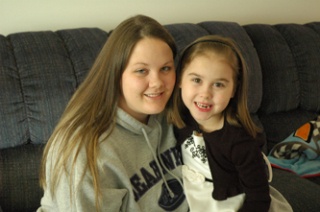MARYSVILLE — A national debate on healthcare has cast a spotlight on a little girl from Marysville.
U.S. Sen. Patty Murray, D-Wash., spoke to her fellow members of Congress on C-SPAN Jan. 28 about the Children’s Health Insurance Program, and cited six-year-old Marysville resident Brenna Krug as one of the millions of uninsured, low-income children nationwide whose healthcare costs are covered by CHIP.
Brenna has cystic fibrosis, and when her mother, Brandy Krug, learned that the U.S. Senate was debating whether to continue funding for CHIP, Brandy wrote her first letter to a member of Congress. Her e-mail to Murray explained that, without CHIP, she wouldn’t be able to afford Brenna’s medical treatments, even if she went into debt to pay for them. Between the $2,200 a month for medicine to help Brenna breathe, the $20,000 a year for the device that strikes her chest and back for hours each morning and night to help clear her lungs, and the number of surgeries that she undergoes each year, Brenna’s medical treatments cost roughly $200,000 a year.
Brandy Krug hopes that CHIP will continue providing for the 13,500 children in Washington state and the 6.7 million children nationwide who are currently covered by the program, because their parents can’t afford private insurance, but still have incomes high enough to disqualify them from Medicaid programs. At the same time, she wants to raise public awareness about cystic fibrosis, a genetic disease which she herself knew nothing about until her own daughter was diagnosed with it at 10 months of age.
“I wanted to know if there was a cure, but they told me there wasn’t,” Brandy Krug said of the disease, which not only causes mucus to build up in the sufferer’s lungs and block their airways, but also weakens their immune system and shortens their life expectancy. “It was a huge shock.”
How long a child with cystic fibrosis might live depends to an extent on which mutation of the disease they’re afflicted with, although Krug emphasized that doctors tend to be “very vague” when diagnosing a sufferer’s life expectancy, since “it doesn’t mean you can’t live past that. People don’t have expiration dates.” She noted that the current median life expectancy for those with cystic fibrosis is about 38 years old, which marks dramatic progress from a few decades ago, when “most children who were diagnosed with it didn’t even make it to elementary school.”
While it’s hardly unusual for parents to worry about their children, Brandy Krug is forced to worry more than many mothers, since even schoolyard germs and common colds pose significant risks to her daughter’s health. This past winter marked a rare opportunity for Brandy to relax, since Brenna hasn’t been sick since April of 2008, but the previous two winters saw Brenna struck by serious illnesses.
“She had bad lung infections, and underwent 18 months of triple-antibiotic treatment,” Brandy Krug said. “Last winter, we were coming back home from the hospital, and as she was sitting in the back seat, she asked me if she was going to die. She was five years old, but I wasn’t going to lie to her. I had to tell her the truth, that yes, she might die. She’s mature for her age, though, so she’s handled it well.”
Brandy and Brenna have already discussed the possibility of a double-lung transplant in Brenna’s future. Brenna has decided that she wants the transplant, if and when it becomes necessary, but Brandy added that Brenna is free to change her mind at any time. In the meantime, Brandy has coped with trying to keep Brenna relatively healthy, which has occasionally led to misunderstandings with other parents.
“When she was a baby, before we got the machine, I had to literally beat on her chest and back to break up the mucus,” Brandy Krug said. “Other people would look and wonder, ‘What are you doing to your child?’ It’s been a hassle for Brenna, too. She’s tired of the treatments, since they take up two hours of every morning and night for her.”
Brandy Krug feels badly about the times when she’s offended other parents, by “hovering over” Brenna when other children sniffle or cough, or by having Brenna wear air filter masks when they go out shopping together, but she also wishes that people wouldn’t judge each other without knowing one another’s stories.
“I’m still a little paranoid of sick kids at school, and other parents don’t always understand,” said Brandy Krug, who admitted that she went through a “germophobic” phase, and even wondered whether to keep Brenna out of public school. “She can get ill from bugs that don’t affect most people’s immune systems, so I worry whether she’ll catch something, and if they’ll find it in the nick of time.”
In spite of these daily struggles, Brandy Krug has learned to treat many of these difficulties as simply another part of her daily routine. Even after being laid off in November of last year, she considers herself relatively fortunate, thanks to her family, friends and neighbors.
“People I didn’t even know raised money to give Brenna a trip to Disneyland,” Krug said. “I’m sure many people are in much situations than us. We’re doing the best we can with what we have. We have to scrape by for money, but what’s truly important is well taken care of.”
If lawmakers approve the proposed addition of $31.5 billion to CHIP, its coverage in Washington could be extended to 5,700 more children.



